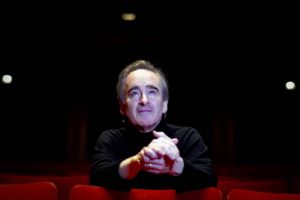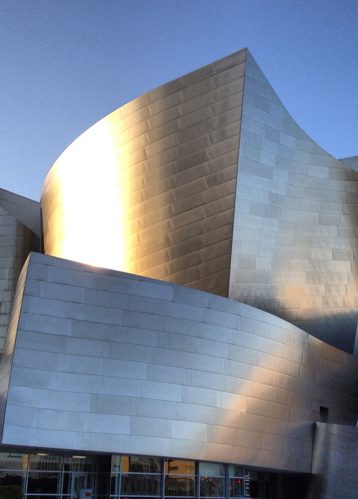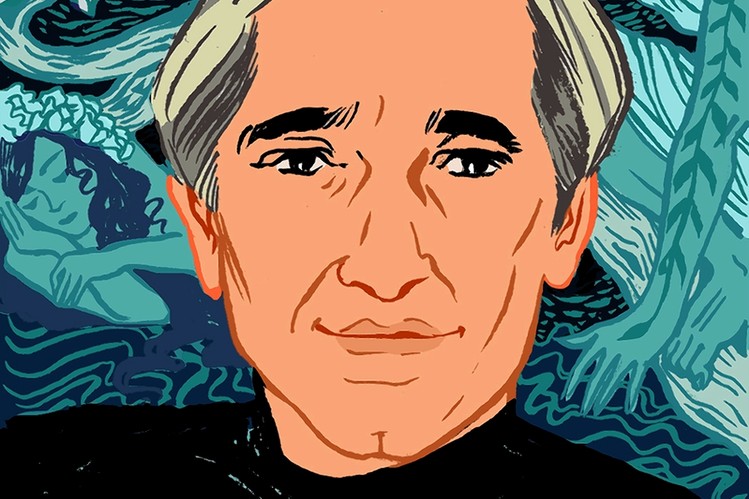James Conlon had an increasingly perplexed expression on his face as he looked through a messy pile of books and manuscripts at his office at the Dorothy Chandler Pavilion. The conductor was searching for an essay he had written on composer Benjamin Britten, the British composer whose centenary is being celebrated this year.
After much effort, Conlon concluded that he must have left the document in his office in New York. But it didn’t matter — he had a digital copy on his computer. And besides, there were more pressing items at hand: this interview, for starters, plus rehearsals for Verdi’s “Falstaff,” which Los Angeles Opera will open on Nov. 9.
For the last few weeks, Conlon’s life has consisted of exactly this — chaotic round trips between New York and L.A., Verdi and Britten. The conductor, who is the music director of L.A. Opera, was recently juggling a production of Britten’s “A Midsummer Night’s Dream” at the Metropolitan Opera in New York, with “Falstaff” rehearsals in L.A.
The bicoastal traveling was no small feat considering Conlon’s recent health scare. The 63-year-old conductor underwent last-minute surgery in August to correct a case of diverticulitis, an infection in the intestines. He said he had been conducting in pain in the months leading up to the operation.
Conlon was hospitalized at New York Presbyterian for four days and then spent a month recovering. He said doctors removed about a foot of his colon.
The conductor will be in L.A. through the end of the year, also conducting a silent-movie-inspired production of Mozart’s “The Magic Flute,” running Nov. 23 to Dec. 15. Conlon’s eldest daughter, Luisa, a filmmaker, is with him, having recently moved from Brooklyn to L.A.
“She passed her driver’s test. And she’s driving on the freeways,” said the proud father.
Here are excerpts from our conversation with Conlon. “Falstaff” runs from Nov. 9 to Dec. 1 at the Dorothy Chandler.
How are you feeling?
I feel great. The problem I had, which was diverticulitis, had developed insidiously over years, and I mean many years, maybe 10. And it came to a crisis in June. And I mean a crisis where you can barely stand. I nevertheless pushed my way through a production of “Macbeth” in Florence — that’s the way I am. I did a Britten concert of “Curlew River” at a church in Rome, which they did for me, and I felt I couldn’t cancel it. By the middle of July, two doctors looked at me and said I had to get operated. But I went to Ravinia — I pushed myself through Ravinia. I had a week off and I planned to go home and get myself checked up and go back, and they wouldn’t let me go anywhere. I said I needed two weeks and they said you have two days… I cannot tell you — I feel like a new person. I had no idea how subtly uncomfortable that condition has made me over a very long time.
Had you known you had it all these years?
No. But there were indications — maybe four years ago. I went to a doctor out here. I was having increasing pain since last January, and I have a high pain threshold and I’m very stubborn. I don’t want to let people down. It’s a character trait that can be extremely dangerous — I was right at the edge. It was a close call.
You’ve been flying back and forth from New York recently.
If you like Shakespeare, it’s great. I hate to be away this long. I don’t like it. “Falstaff “represents for me the best possible homage and offering to Giuseppe Verdi whom I love as if he were a relative. It is his greatest work — it sums it all up, it’s a testimony to life and rebirth. I guess I’ve been thinking about that a lot these days.
How many times have you conducted “Falstaff”?
Here, I’ll give you the stats. I’m getting to the age where I’m starting to write everything down. I’ve done well over 400 performances of Verdi operas. Wagner, Mozart and Puccini are all in the 160’s. This will be my sixth production of “Falstaff.” My first one was my first paying job I ever had in 1972 — right out of school. I left the day I graduated from Juilliard and went to Central City, Colo., and conducted “Falstaff” for the first time.
Britten and Verdi are extremely different.
They are totally different. You can’t imagine. They both got into my system when I was young. Verdi absolutely from the beginning — the first opera I saw was “La Traviata”… But I was exposed to Britten at 15 or 16 — the big event was the new production of “Peter Grimes” at the new Metropolitan Opera. My brother and I used to stand in the standing-room line. We prepared for it — we got the recording and listened to it… I became right there a Britten fan. It’s been in my system all these years.
For a Britten neophyte, what piece would you recommend?
There’s so much Britten that I don’t even know all of it. It’s hard to say — I’d say there’s something for everybody’s taste. If you like songs, there are song cycles. “The War Requiem” is his masterpiece, and I highly recommend it to everybody. I first conducted it in 1979. I just did it again this year, and I realized this year that it was so contemporary — he was the contemporary composer for me when I was growing up. Whenever there was something new, I knew about it.
How many productions of “The Magic Flute” have you conducted?
I think it’s six. I also made a film of it with Kenneth Branagh. [Conlon conducted the soundtrack for the 2006 movie.] I love Ken Branagh. To see him work with people was wonderful. I had two requests — no changing of the music and no cutting — and that was respected.
Have you seen this production of “The Magic Flute” that will run at L.A. Opera?
I went to Berlin to see it in order to decide if we ought to do it. It’s an extraordinary idea and an extraordinary execution of that idea. For L.A., the birthplace of movies, it’s a perfect fit.


